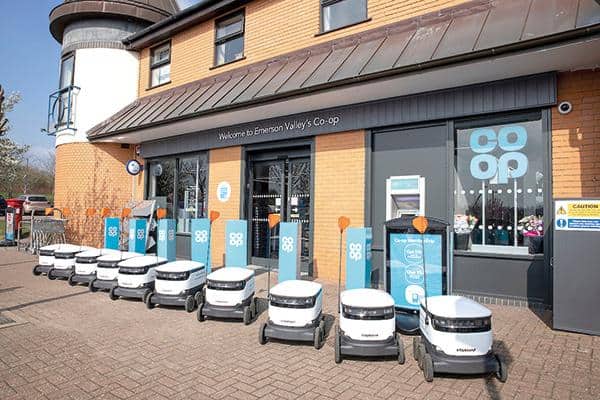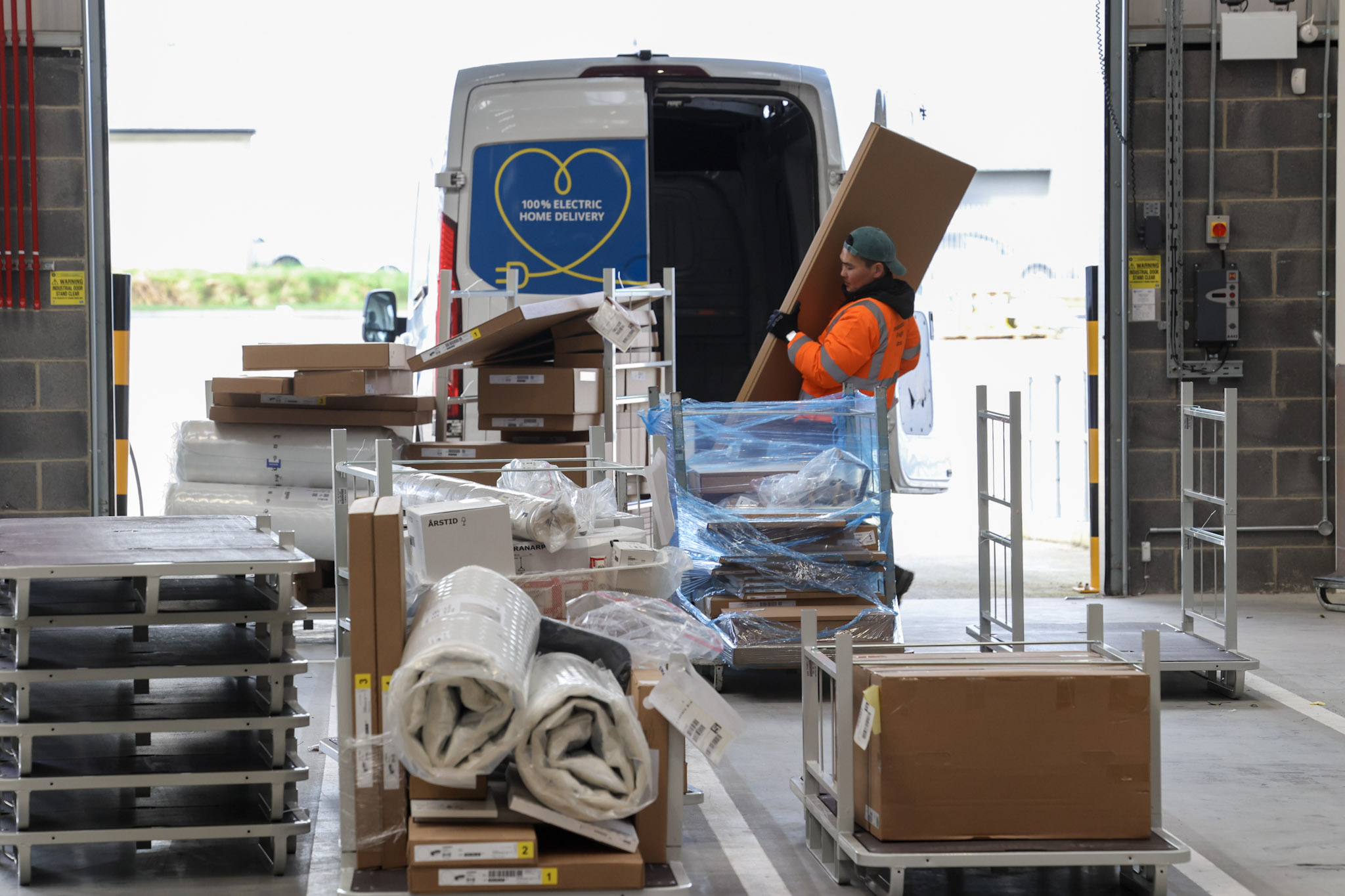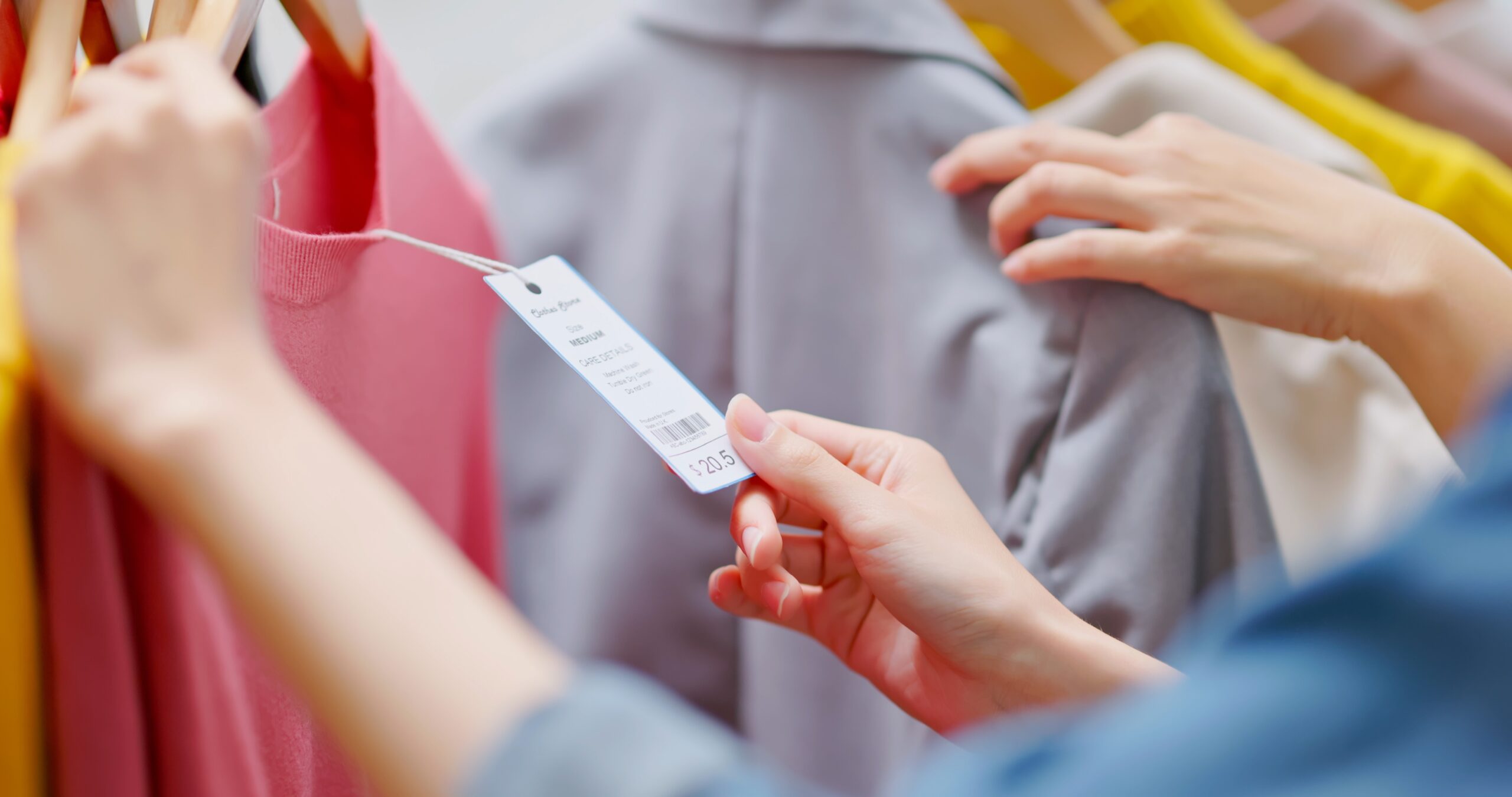Co-op has been putting Starship delivery robots to the test in Milton Keynes and has recently rolled out the scheme to a second store in the area as well as expanding online ordering to new areas. Emma Herrod caught up with Jason Perry, Senior Manager Ecommerce Strategy & Rollout, Food Digital, Co-op at the recent eDelivery Expo.
Convenience retailer Co-op has made more than 15,000 deliveries to customers using autonomous robots from Starship Technologies since starting a trial in April 2018. (The robots themselves have been tested in 100 different cities around the world by a number of retailers including Domino’s Pizza, with the robots encountering 12m people along the way.)
Up to 60 robots operate from the Co-op’s Monkston Park store in Milton Keynes delivering groceries which shoppers in the area have ordered online. Most of the orders are top-up rather than large weekly shops, explains Jason Perry, Senior Manager Ecommerce Strategy & Rollout, Food Digital, Co-op, but “if the order is too bulky for one robot, we send another one behind it,” he says.
The delivery area stretches to 2.7km south of the store and 2.2km north with it taking the robots up to 60 minutes to travel the full distance. Through the use of neural networks, the robots learn about the area in which they are deployed becoming quicker over time as they learn from previous journeys how to handle the various traffic junctions that they encounter.
The operational side of the grocery orders is handled by Starship which, at the beginning of each day, delivers robots and all of the batteries that they will need for the day to the store. The robots are loaded with their grocery order in front of the store so nothing inside has had to be changed. The order is picked by Co-op staff from items on the shelves.
As Perry explains, Co-op has quite small shops, not 25,000 sq ft supermarkets, so picking and then putting an order of 7 or 8 items through a till and into a Starship robot is a two-minutes job and the extra cost of picking a customer’s order can be absorbed “into what the customer is spending”. The delivery charge to the customer is £1 but there is no minimum order size.
CONTROLLED BY AN APP
The process is easy for customers too, explains Perry. First they need to download the Starship app and select their neighbourhood. In all, nine locations including a university campus in the US are included in the app since the same system is being used by a number of retailers testing the autonomous robots.
With the app downloaded, the customer can shop from a range of 700 products on the site. Perry explains that it’s about a quarter of the product range and includes chilled items but nothing that is age restricted such as alcohol since without a delivery driver, no-one is able to verify the age of the person taking receipt of the order. There is demand for it though and alcohol is the number one thing that people are asking for on the service’s Facebook page behind expansion to their area.
Rather than having to enter a delivery address in the app, the shopper places a pin in a map showing the location of where they want their delivery. Deliveries are made within an hour and the exact time until a delivery can be made to the shopper’s specific location is calculated at this point and shown to them in the app. “Orders are typically delivered in 30 minutes, including picking time,” says Perry.
The accuracy of the delivery location down to a few feet has enabled some interesting use cases, he explains. People have been ordering chilled picnic items before they leave home and had them delivered to the park for when they arrive. A thermal insulated layer within the robot keeps items at the right temperature and keeps them away from any ambient temperature products.
The shopper is able to track their robot within the app too in what Perry describes as an Uber-like experience.
When the Starship robot arrives at the shopper’s pin location they unlock it via the app, open the lid and remove their order.
Pre-empting a question that he’s asked regularly about why none of the Starship robots have been stolen, Perry explained to the audience at the eDelivery Expo that each robot is equipped with 8 cameras at the front and rear, is GPS tracked within a couple of inches, has radar guidance, can be remote controlled by Starship, will sound an alarm if picked up and is enabled with two-way communication. The robots are also mechanically locked so the contents can’t be removed until it is unlocked by the customer via the app. “Whilst it may make a good coffee table at home, there aren’t many other applications,” says Perry.
CUSTOMER ADOPTION
Adoption of the service has been growing since its launch in April 2018. “We’ve seen a 4.5x increase in weekly orders since launch,” says Perry “and that’s steadily growing”. Of the nine thousand households in the store’s delivery area, around 80% have downloaded the app and 40% of that number have placed an order.
Sunday is the busiest time for the service since “more people are at home at that time” and “there is demand for the service.” Saturdays see the next level of volume, followed by an even number of orders across Thursday, Friday and Wednesday. Monday and Tuesday see the least number of orders.
The end of March saw the trial extended to a further store in Milton Keynes, with the first order placed within 10 minutes of the trial being switched on there. Around 2,000 homes can access the service fulfilled from the Emerson Valley store but while this is a smaller area than the Monkston Park trial it raises new challenges for the Co-op, its store colleagues and customers since the store has never undertaken delivery of online orders before. The Monkston Park store is used to fulfil orders by Deliveroo as well.
Co-op will be working with Starship on extending the range of products offered online from this store and increasing shoppers’ basket size. It also has plans to expand to other areas, including more challenging areas, too. “I’m not going to say that this is going to go to every shop across the Co-op as there are places where it will work and places where it doesn’t,” says Perry.
As the link with Deliveroo at the Monkston Park store shows, Co-op is busy testing different ways to extend its convenience model with customers. It already offers a delivery-to-home service for shoppers not able to carry their own shopping once they have paid for it from 200 stores. It is also testing a Pay in Aisle mobile app enabling shoppers to ‘scan and go’.
Co-op’s own online grocery service went live in London on 22 March. Shoppers in a 4km radius of the store on the King’s Road can order groceries from shop.coop.co.uk and have them delivered within two hours by electric bicycle. There is a standard £5 delivery charge and a £15 minimum spend. Co-op has also introduced a free click and collect service at the store.
Ultimately, Co-op’s mission is to be the number one convenience retailer in the UK and this means giving customers choice in how they want to shop.
The grocer will make online shopping available in a “significant number of UK towns and cities” but as Perry says, “there is not one thing that will fit every store”. The retailer, therefore, will continue to test a blend of solutions in different locations.






